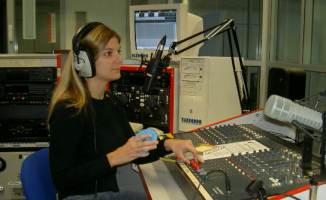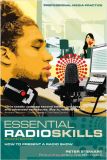Here’s some information on how to create a demo tape to help you apply for a job on a UK radio station – What to do, and how to submit it.
Preparing your ‘Demo’
If you’re looking for a job in radio presentation, then your Audition Tape (commonly called a “Demo Tape” or “Showreel”) is far more important than your CV. Here are a few tips for putting together your demo tape:

- Production: Your demo should be well-produced and sound as polished and professional as possible. If you can, we recommend that you make your tape in a recording or broadcast studio and make your links sound “as-live” (as if you were on the radio, as opposed to creating a demo). If you don’t have access to a radio studio, make use of your PC to record your demo – there are several PC audio editing packages that can be used to record and edit your demo. See our Voice Recording section for information on how to use your PC to record and edit audio cheaply at home.
- Branding: Listen to the radio station that you are applying to, and target your tape to that station’s format. Use the name of the radio station as well as any slogan lines that the station’s using. A demo that uses the station’s name and programming style is much more likely to be well-received than yet another generic audition for any-old radio station. It also makes it easier for the Programme Controller to imagine how you’d fit into the station’s format.
- Timing: Programme Controllers are very busy people, and they don’t have time to listen to every single audition that they get sent. The trick is to keep yours short, but targeted. You should be able to sell yourself in no more than 5 minutes. Remember – first impressions last, so make your first link your best. A naff link, or an ugly-looking CD cover will result in your audition being binned.
- Music: Keep the music in your demo to a minimum – just use it to show how you interact with the songs. Keeping the music to 5 seconds or less helps to ensure the demo is listened to all the way through. Just play a few seconds of any songs you use on your demo, fading it out as soon as appropriate.
- Grab them early: Radio stations can get dozens of demos sent to then each week by budding presenters, and you need to grab the listener’s attention early to stand a chance of having the whole demo listened to. Try hard to sell yourself and your style in the first thirty seconds of your demo, as that’s all a busy PC may listen do before making a decision.
- Content: Try to demonstrate your versatility – perhaps include links that demonstrate your ability to read ‘straight’ content (such as a news report or travel flash) as a contrast to your lighter side – this helps prove to a future boss that you can be of use to a station. Also include production work (voiceovers / adverts / jingles) if you’ve done them, to demonstrate you’re multi-skilled.
- Bottom line: Key words from one Programme Controller we’ve worked with: On your demo tape, “Be clear, bright and compelling”.
Sending in your ‘Demo’:
Once you’ve completed your demo, it’s a case of sending it off to the right station, and the right person. Here’s some useful information:
- Format: Tape or CD? The rule used to be to use a decent quality audio cassette, but with cassette’s copy protect tabs left untouched. This is an old radio joke, meaning that the tape was likely to be wiped and re-used! Nowadays, most people now send in demos on CD, minidisc, or even email an MP3 audio file of their audition. Other hopefuls create a website with examples of their shows, plus a few photos. The best bet is to check with your target radio station and find out their preferred format for demo tapes before sending anything in – again, it’s all about giving yourself the best chance of getting listened to. You could also consider uploading an MP3 file to the Internet, then mailing your web address to a station.
- Sending it: Once your demo is complete, package it up and send it to the right person at your target radio station, enclosing a a well-presented covering letter. Call ahead to get the right name, job title and address to send the tape to.
- Details: Remember to include your phone number and email address when you send the demo in. Put this information on the CD or minidisc as well as on the covering letter, in case the two get separated.
- Follow-up: Follow up your demo with a phone call after a couple of weeks – this shows that you’re keen.
- No joy yet? If your demo hasn’t landed you a job yet – don’t despair. Programme Controllers listen to demos in batches, normally when they’re running short on talent, so there could be a wait. There’s also the danger that they’ve heard your demo, and weren’t impressed. If that’s the case, it might be an idea to get some more ears on your audition piece. Ideally, talk to a radio station Programme Controller, or someone else in the industry, to see what they’re looking for in a demo. Play your demo tape to other people in the industry to get some opinions on how you sound, and ways to improve.
If you’re looking to put together a killer tape, get advice from the professionals – perhaps contact someone in the industry and ask what makes a good tape. Alternatively, check out our radio courses section, where you’ll find details of companies offering presenter training in the UK.
A final tip – consider making your tape available as an MP3 file for download from your website, or even consider making a podcast of some sample shows. Need help with this? Ask in our forum
Other useful radio links:
- Radio courses – information on learning more about radio training courses
- Working in radio – Some basic info on how to get started
- Recording voice onto a PC – Practical advice on recording yourself on a PC
- Our Radio forum – Talk about working in radio in our forum
- Further reading – Books for those looking to work in radio or TV
- Radiopresenting.com – Information and resources for those looking to become a presenter
| Got a question or need more info? Please ask in our UK Radio forum |



Great. Am an aspiring Broadcast Journalist with a wide inclinationt to Radio, been doing much of Editing but now looking up to try out Broadcast. This article has given forward great insights, have lately tried out Demos to no avail, am now wiser, Thanks.
I need a voice demo for my radio station,
You listening jcl star radio
2 jcl star radio new generation
I have had a 22 song complitation made 4 locomotive songs 3 female demo singers Brian Hall my veteran vocalist I enjoy bedtime easy listening gets me off to the land of nod
Thanks for your interest
Frank